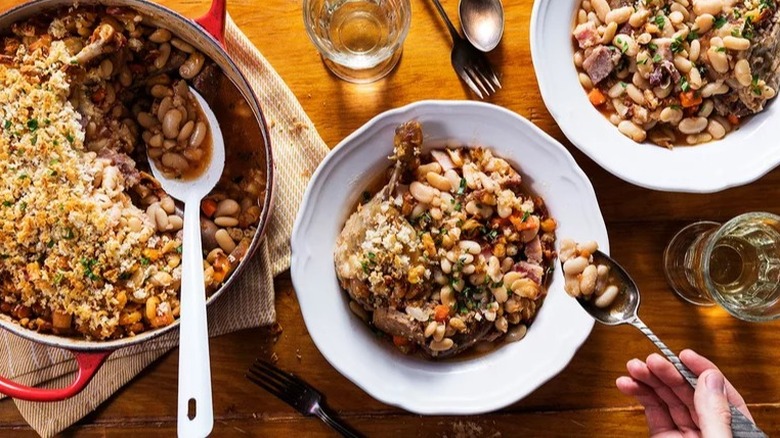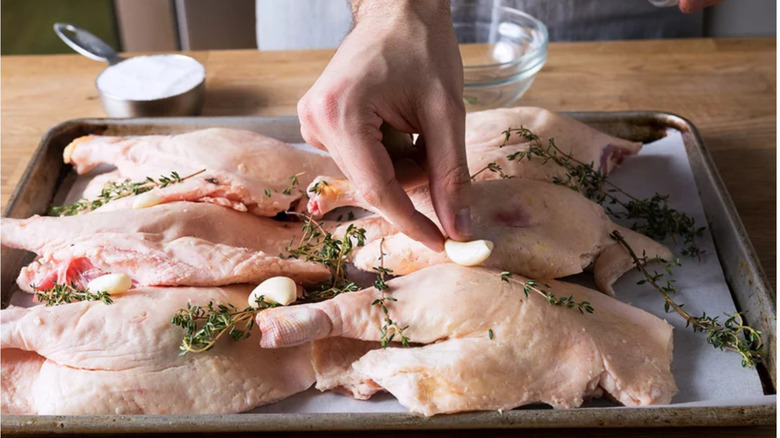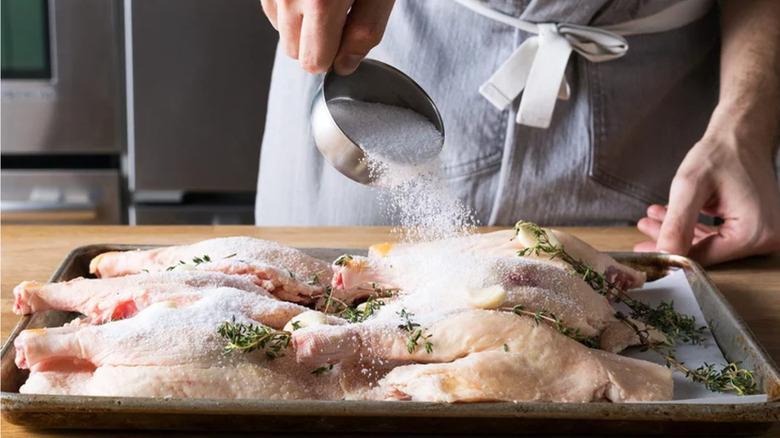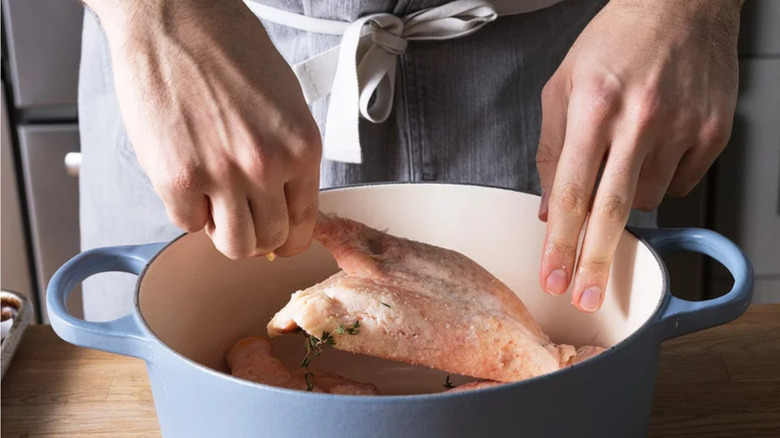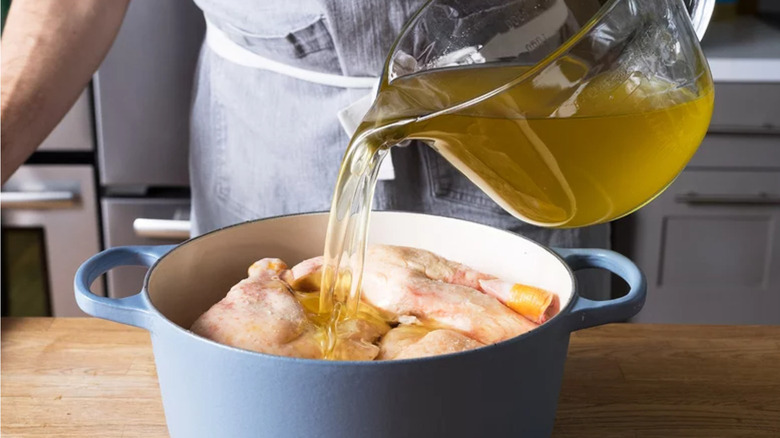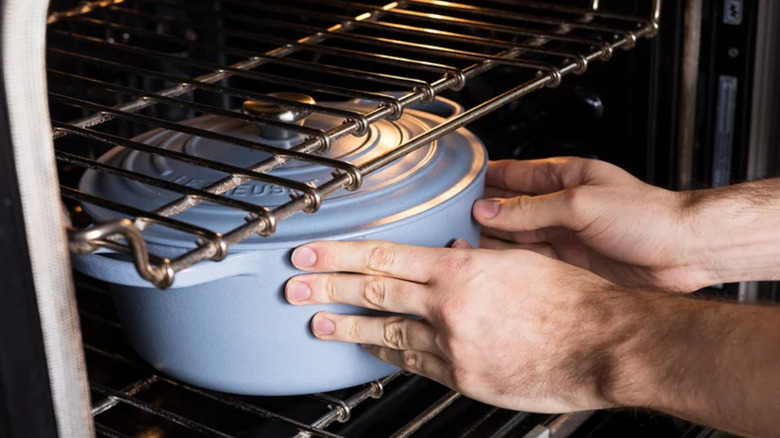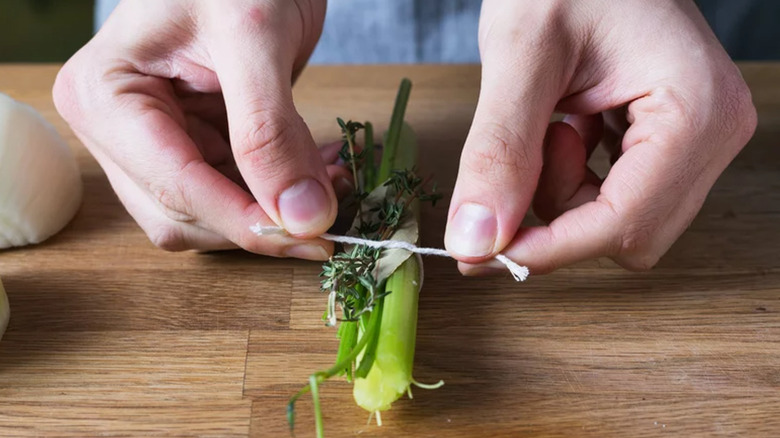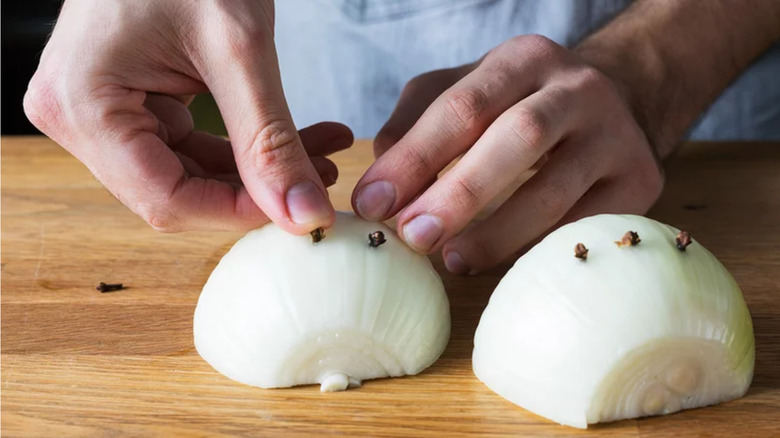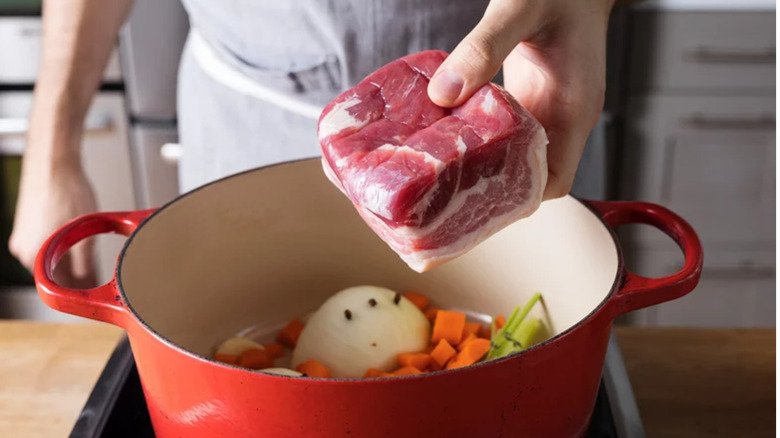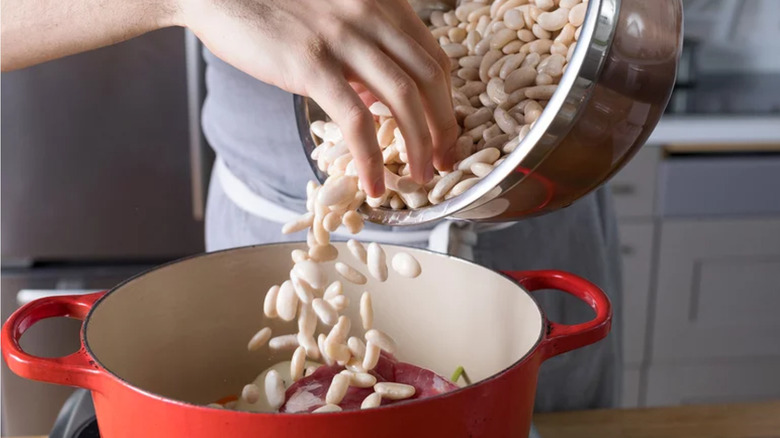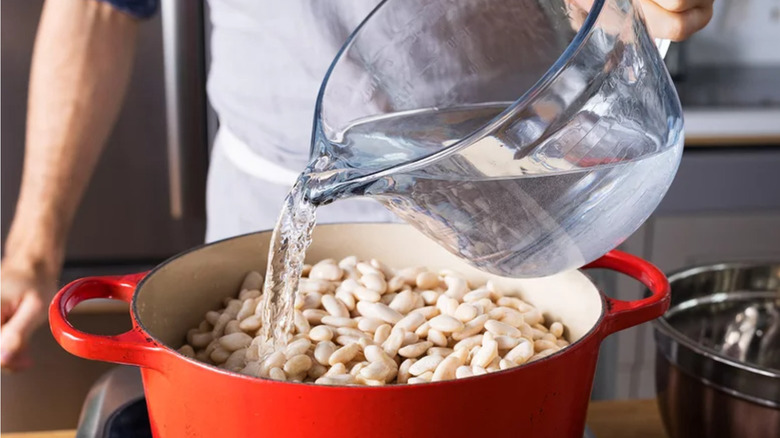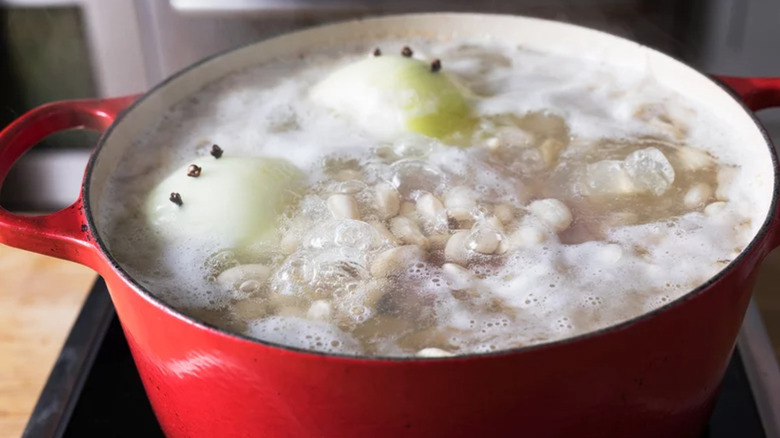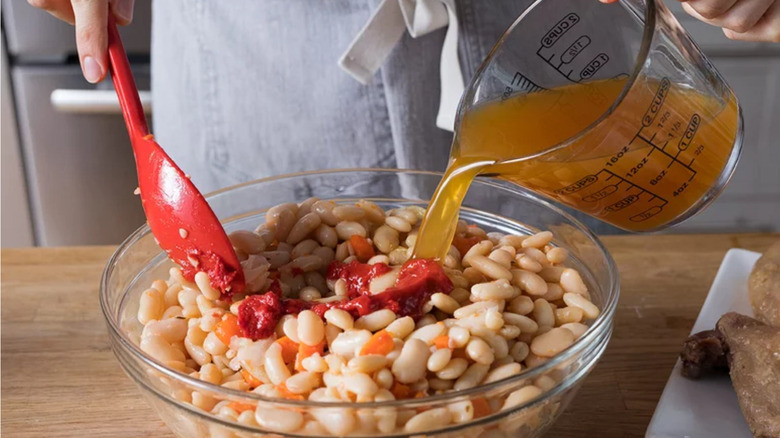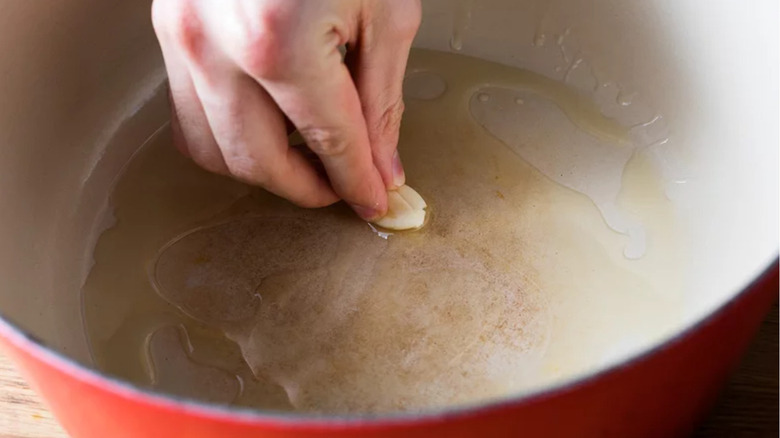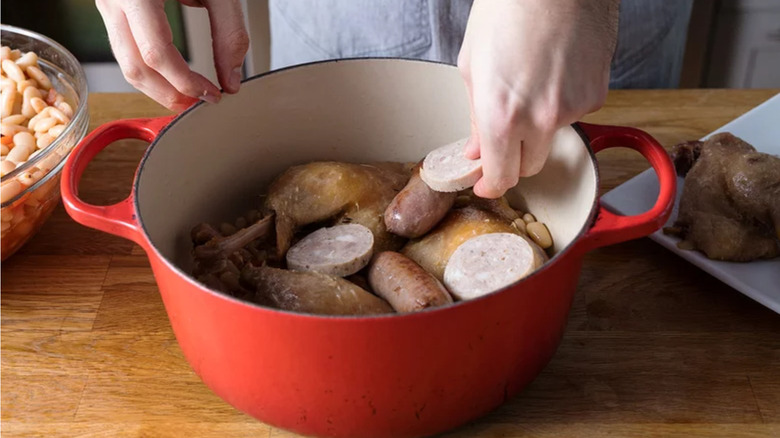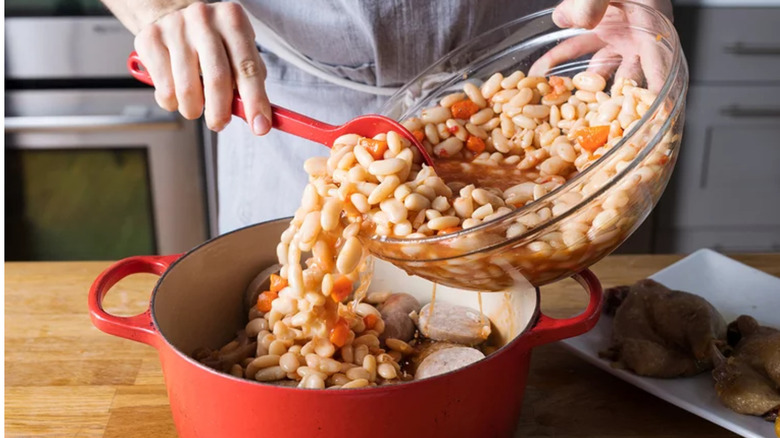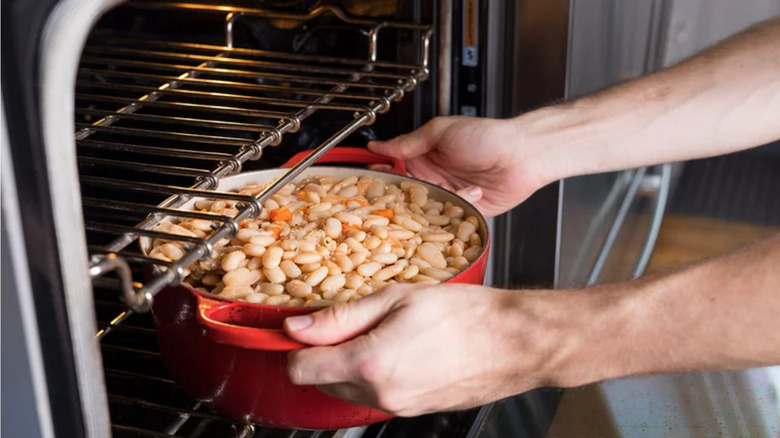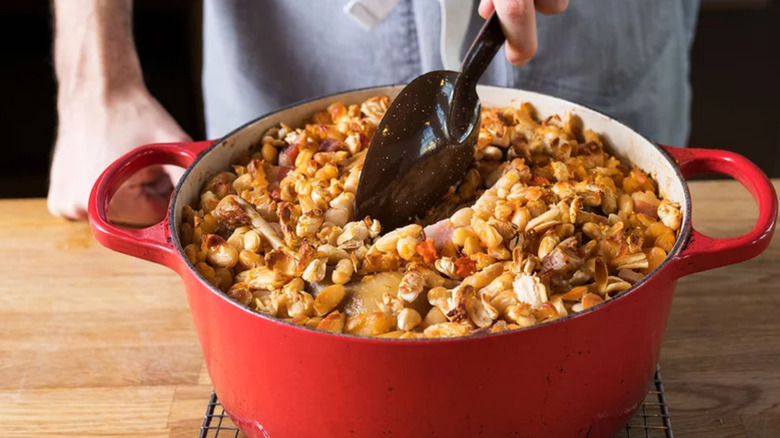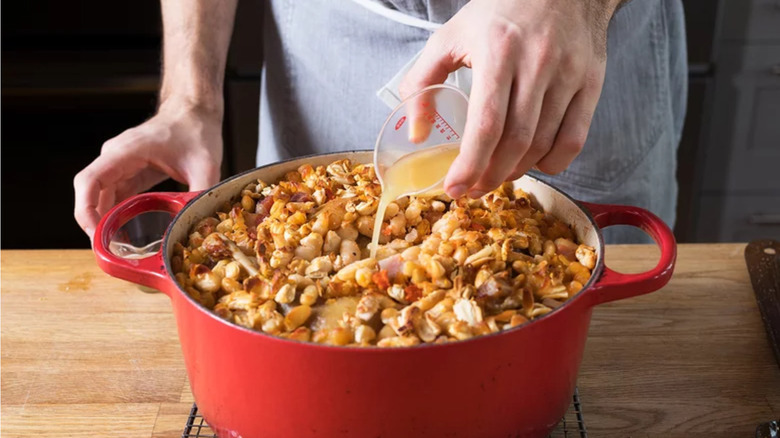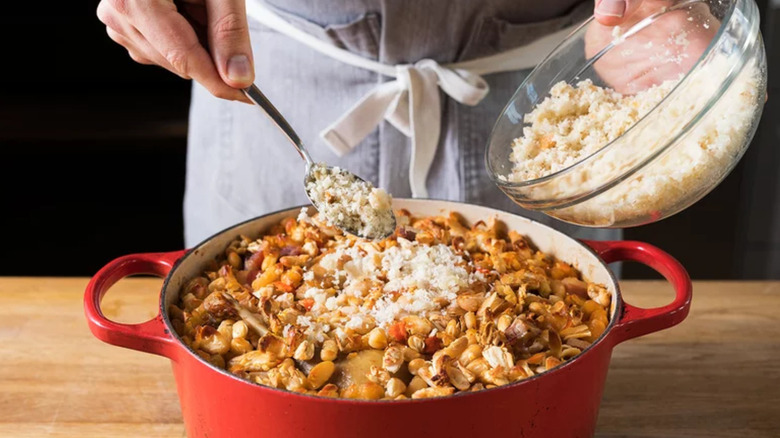How To Make Classic French Cassoulet
The revival of classic French cooking is still going strong, so if you've already tried your hand at homemade croissants and taken boeuf bourguignon for a spin, it's time to turn your attention to the ultimate French comfort food: cassoulet.
This classic stew from Languedoc made with white beans braised with confit duck legs and garlic sausage (see the recipe) is an ideal project to try out before winter is over. The whole process might take three days, but you end up with so much that it'll take you just as long to eat it. (And if you're looking for a shortcut, check out our Instant Pot cassoulet recipe, too.)
According to Ariane Daguin, CEO of D'Artagnan and an avid cassoulet maker, this dish came to be after Castelnaudary, a town in the South of France, was besieged. "They started to run out of food, and the mayor asked everyone to bring what they had in their cupboards to the middle of the village. Because it was winter, they had beans and preserved meats. They put it all together, and that was how they created the very first cassoulet."
The dish has evolved over the years to become a staple dish in French cuisine. "For a lot of French people, it's also something that's really nostalgic and emotional; for me, it's what I ate every Christmas with my family growing up," Dominique Ansel, pastry chef and owner of Dominique Ansel Bakery, explains. "It's my turkey or Christmas ham and reminds me of these memories from when I was a kid." Ansel still makes his three-day cassoulet every Christmas, dumping an entire bottle of Riesling into the mix.
With the resurgence of all things French in the dining world, chefs are putting this homey comfort food on their menus, and we're eating it up. Daguin even began an annual Cassoulet War, an event where chefs flex their creative muscles with variations including chorizo or chicharrones. And because of the recent popularity, we've consulted with our cassoulet experts for tips and tricks on mastering the classic.
Bean Cuisine
"A perfect cassoulet is all about the white Tarbais beans," Ansel says. And every chef we speak to agrees that this particular kind of bean is crucial for a great cassoulet.
The beans are cooked with salt pork or ventrèche (a French version of pancetta) and vegetables, which makes a rich base for the stew. Unlike other white beans, Tarbais hold their shape when cooking, while turning soft and velvety inside. The long cooking will allow for some of the beans to break apart, thickening the broth slightly for the perfect consistency.
Duck Dynasty
Though some chefs say it's all about the beans, others argue for the duck confit. "The key to a perfect cassoulet is the slow confit of the ingredients," Ludo Lefebvre, chef and owner of Petit Trois in Los Angeles, says. Though the chef did not grow up eating the stew because he comes from a different region in France, he has grown to love it and serves it on his menu. For a proper duck confit, Moulard duck legs are cured overnight with salt and herbs before slowly cooking in duck fat in the oven. The result isn't just a fall-off-the-bone duck leg, but a pot of duck fat, fortified with more duck flavor and the herbs and garlic from curing.
This fat is liquid gold. It's what we use to cook the sausage, grease the pan, toss with the bread crumbs and just pour over the stew. Even then, there's still plenty of extra duck fat left over, which can be kept in the freezer for future cassoulets or used just to cook with (it's the secret to perfect roast potatoes and Chex Mix).
We've Got the Meats
It doesn't stop at beans and duck confit, however. A cassoulet is packed with pork products, from the salt pork in the beans to the heaps of Toulouse sausage. Laetitia Rouabah, former executive chef of Benoit in NYC and a competitor in the most recent Cassoulet War, explains that the original recipe she learned has confit duck leg, lamb neck, salted pork belly, Toulouse sausage, garlic sausage, pork ribs and goose fat all in the pot. At Benoit, she even adds pork shank and pig's ears. We go with a combo of French garlic sausage and duck sausage.
Crust Is a Must
One of our favorite parts of this dish is how passionate chefs feel about their particular way of making cassoulet, and one of the divisive issues is the use of bread crumbs. At the end of the three-day affair, the cassoulet stew gets baked to form a crust. In Toulouse, it is common to add bread crumbs, an addition we love and use in our recipe. However, Daguin tells us that adding bread crumbs is heresy. Whatever liberties you take, just make sure you're using fresh, quality ingredients.
Now, pick a weekend to try this culinary adventure. We promise you'll be thanking us in the end. Oh, and don't forget the ultimate requirement in French cooking: plenty of crusty baguette. Something Ansel recommends for sopping up all the broth. Another pro move.
1. Lay out the duck legs
Lay out your Moulard duck legs with the garlic and thyme on a parchment-lined sheet pan.
2. Sprinkle the duck legs with salt
Cover with salt, making sure to coat both sides, then refrigerate overnight.
3. Place the duck legs in a Dutch oven
The next day, place the legs in a 4½-quart Dutch oven, overlapping them to fit.
4. Cover the duck legs with melted fat
Cover with melted duck fat, making sure the legs are submerged.
5. Cook the duck legs in the oven
Cook low and slow in the oven until tender, 2 to 2½ hours.
6. Make a bouquet garni
Tie together parsley stems, thyme sprigs and a bay leaf stuffed in the crease of a celery stalk.
7. Press cloves into onion halves
Stud the halved onion with 6 cloves.
8. Start cooking the salt pork
Add the vegetables, bouquet garni and salt pork to the pot.
9. Add overnight-soaked Tarbais beans
Add in the overnight-soaked Tarbais beans.
10. Cover the beans with water
Cover the beans by at least 1 inch with water.
11. Simmer the salt pork and beans
Simmer until tender, adding more water as needed to keep the beans submerged.
12. Drain beans and toss with stock
Once cooked, drain the beans, discarding the onion and bouquet garni. Transfer the beans to a bowl and toss with the chicken stock and tomato paste. Roughly chop the salt pork and stir into the beans.
13. Sear the duck sausages
Sear the duck sausage in some of the reserved duck fat from the confit until golden brown.
14. Grease Dutch oven
Grease a 4½-quart Dutch oven with duck fat and garlic.
15. Place beans in the Dutch oven
Start with a layer of beans at the bottom.
16. Add duck confit and sausages
Add half of the duck confit and sausages, making sure to cover the entire surface.
17. Add more beans to cover the meat
Add another layer of beans to cover the meats.
18. And another layer of duck confit and sausages
Lay out the remaining meats.
19. Top the pot with beans, and bake
Top with the remaining bean mixture, then bake until a crust forms.
20. Create a hole in the cassoulet
After 45 minutes, break a hole in the center of the crust.
21. Pour some stock into the hole
Pour in the chicken stock and duck fat, then continue to bake until another crust forms.
22. Top with bread crumbs and bake again
To finish, top with fresh bread crumbs and bake until golden. Serve with a crusty baguette.
